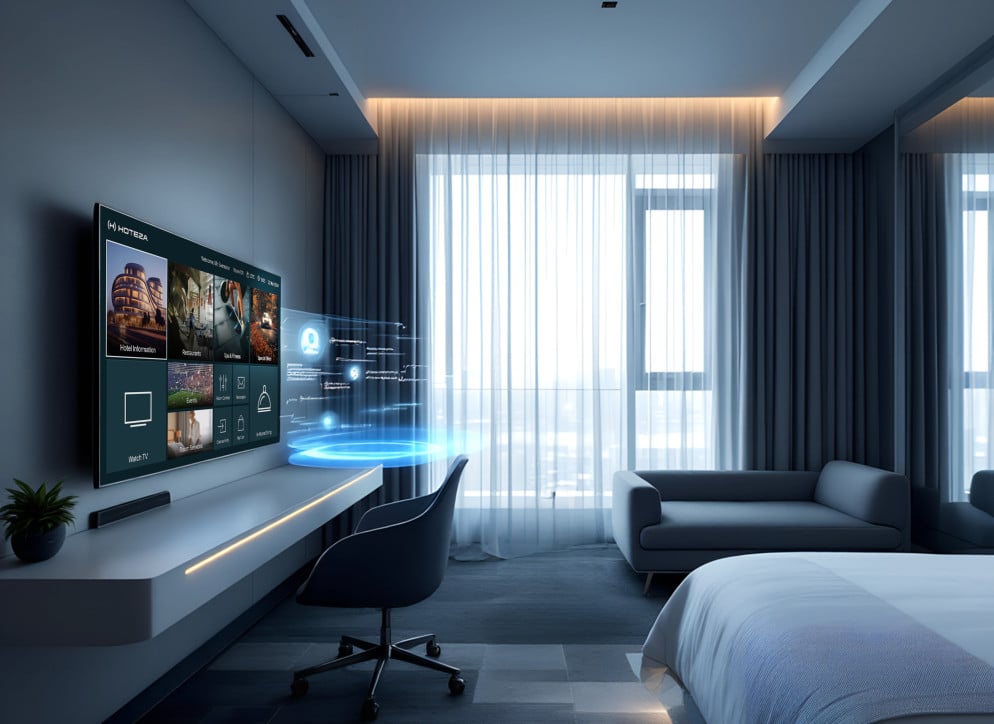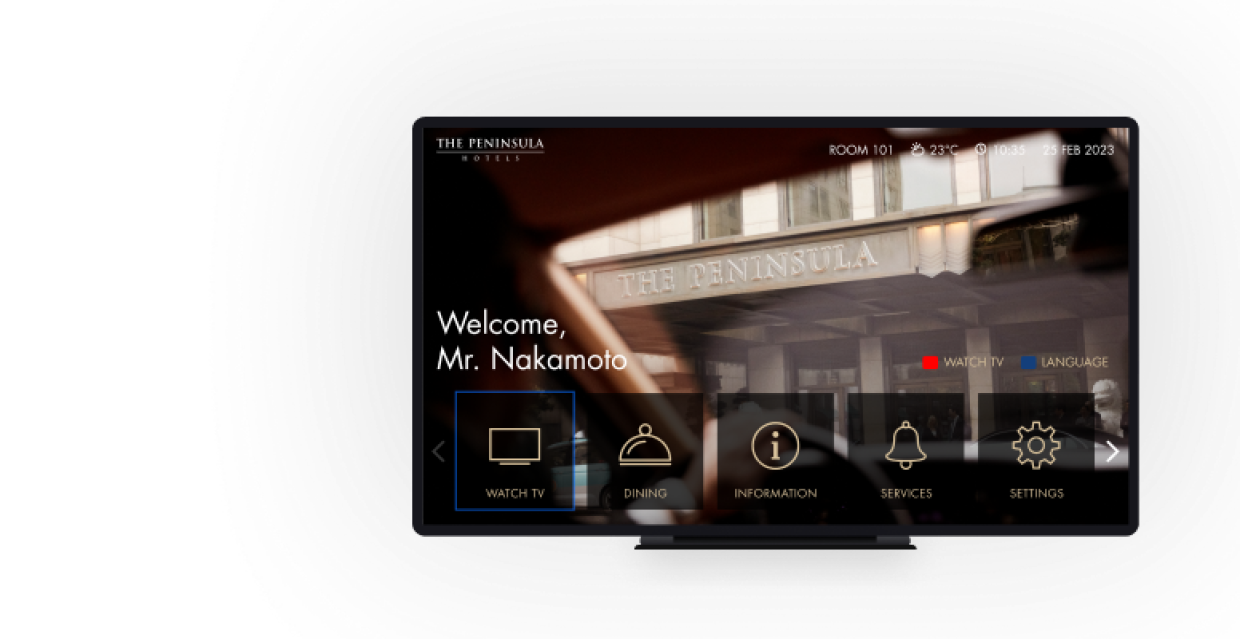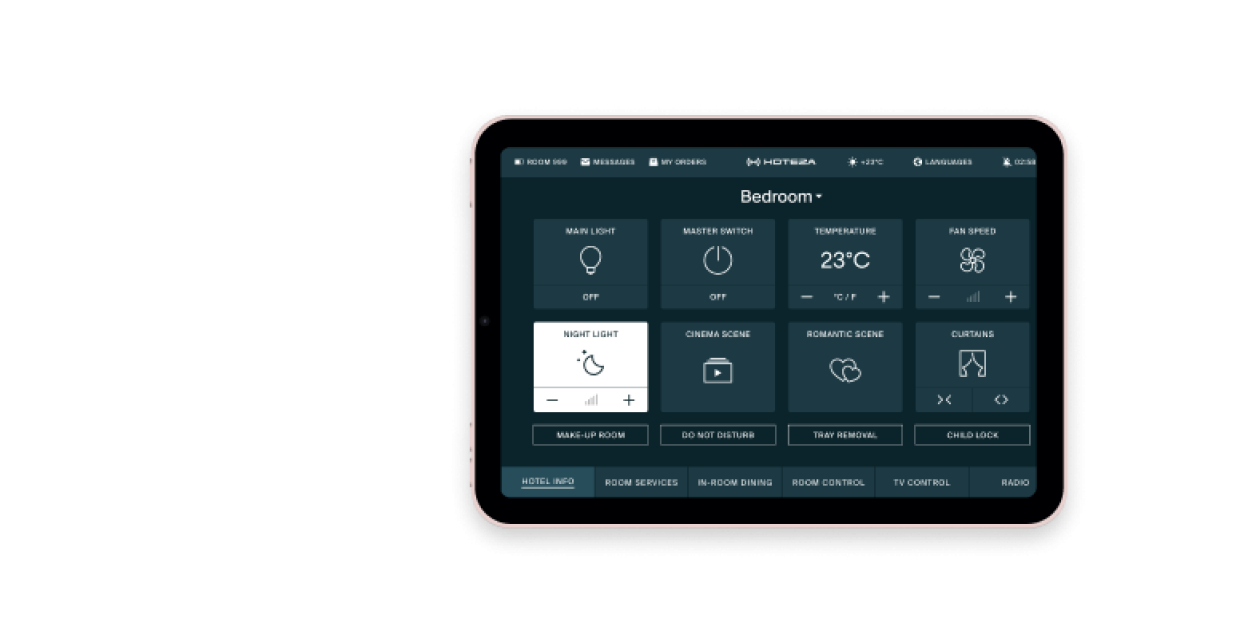15.05.2025
AI in Hospitality: How Hotels Use Artificial Intelligence
Hotels embrace AI to personalize guest experiences, automate services, and drive revenue growth. Learn how smart technology is transforming hospitality.

AI has become a driving force within various industries – hospitality is no exception. Hotels leverage artificial intelligence to enhance guest experience, optimize operational efficiency, and improve financial performance.
Understanding how AI can be integrated into a hotel can let you embrace the technology era and maintain a competitive edge.
What Is AI and How Do We Apply It to Hospitality?
AI in Hotel Operations
Artificial Intelligence in hospitality refers to the tasks typically handled by humans – learning from data, integrating with guests, making decisions and more. Most common examples of AI tools are chatbots, virtual assistants, predictive analytics, and automated systems – everything is designed to streamline operations and bring guest satisfaction to a whole new level.
These technologies support both guest-facing and back-of-house functions, improving processes like booking, check-in and check-out, room service, and operational management. The result? Faster service, relaxed staff, greater personalization, and higher efficiency.
The Rise of AI in Hospitality
AI use in the hospitality industry in increasing rapidly as hotels respond to changing guest expectations, rising competition together with the push for digital transformation. From luxury chains to independent hotels, businesses are turning to AI – optimizing performance and enhancing service quality.
Businesses of the industry keep investing in AI-powered solutions, driven by their ability to boost guest satisfaction and reduce operational costs while increasing revenue.
Why Do Hotels Need AI?
Seamless Personalization and Guest Experience
One of the biggest advantages of AI in hospitality is personalization. AI is able to analyze a gigantic amount of data, allowing hotels to tailor their offerings. Personalized welcome messages, room settings adjusted automatically to guests preferences, customized activity, travel recommendation and much more – enhances guest satisfaction and loyalty significantly.
For instance, a returning guest can be greeted via a guest app, with tailored suggestions based on previous stays – ensuring a personalized and memorable experience.
Reduced Costs and Operational Efficiency
AI streamlines hotel operations, automating repetitive tasks. AI-powered chatbots handle common guest queries, significantly reducing the workload of front desk staff. Automated check-in systems decrease waiting times and enhance overall operational efficiency.
In-room AI applications such as smart thermostats, lighting controls, and voice-activated assistants allow guests to manage their environment effortlessly while reducing energy costs for the hotel.
Data-Driven Decision Making and Forecasting
AI can analyze data predictively which enables it to make data-driven decisions. AI tools can easily forecast occupancy levels, guest preferences, market trends, and revenue opportunities based on historical and real-time data. And the accuracy is impressing! These insights inform strategic decisions on pricing, staffing, marketing, and operational planning, significantly improving profitability and competitive positioning.
Real Examples of AI Applications in Hotels
Seamless Guest Support – Chatbots and Virtual Assistants
AI-powered chatbots and virtual assistants provide 24/7 instant support, completely transforming guest communication. It handles reservations, responds to common questions, and assists with requests in real time – receptionists are no more bothered.
Hotels using chatbots report faster response times, increased guest satisfaction, and reduced pressure on front desk teams, making AI a valuable asset for guest services.
Smart Rooms and Voice-Control
Many hotels started featuring AI-enabled smart rooms where guests can control lightning, temperature, curtains, and entertainment using voice commands. Powered with Amazon Alexa or Google Assistant, the features offer convenient, accessible, modern, and memorable experience.
For example, a guest can simply say, “Turn off the lights” or “Order room service,” transforming the stay into an extremely comfortable and interactive one.
Dining, Deals, and Activities – Personalized Tips
t is no problem for AI to analyze guest preferences and past behavior to deliver tailored suggestions for on-site amenities and nearby attractions – what an amazing feature for guests craving for unique experiences! Whatever it is – a curated dining experience, spa offer, or local tour, AI will help drive engagement and boost revenue.
Guests receive personalized suggestions according to their preferences – it creates a customized experience, enhancing satisfaction and encouraging repeat visits.
Dynamic Pricing – Smarter Revenue Management
AI-driven pricing systems use real-time data to adjust room rates based on demand, seasonality, competitor pricing, and booking trends. This approach helps hotels maximize occupancy while optimizing revenue per available room (RevPAR).
Hotels using AI for revenue management show stronger financial results, particularly during peak seasons or events – turning data into higher profits.
How to Integrate AI with Hotel Technology Platforms?
Guest App and Personalized Messaging
Guest Apps with AI technology personalize communication and enhance engagement. Hotels using Hoteza Guest App with AI-driven messaging manage to send guests timely, relevant notifications, special offers, or personalized greetings – right in time! This way they significantly enhance guest interactions and satisfaction.
AI integration with guest apps also allows hotels to gather valuable data on guest behavior and preferences, continuously refining their personalization strategies.
In-Room AI via TV and Smart Tablets
AI-powered IPTV systems and smart tablets like Hoteza’s HotPad offer interactive, personalized experiences directly in guests’ rooms. Guests can control room features, request services, access local information, and enjoy personalized entertainment options through intuitive interfaces.
Such integrations significantly boost guest convenience and hotel revenue by promoting ancillary services such as room service or spa treatments directly within guest rooms.
Predictive Maintenance and IoT Systems
AI and Internet of Things (IoT) integration enhance predictive maintenance capabilities. Sensors embedded in hotel equipment gather data analyzed by AI systems to predict potential failures before they occur, reducing downtime and maintenance costs.
For instance, IoT sensors in HVAC systems or elevators can detect irregularities, triggering preemptive maintenance. This proactive approach ensures seamless guest experiences by minimizing service disruptions.
Challenges Hotels Face in Implementing AI
Data Privacy and Guest Consent
Implementing AI involves managing vast amounts of guest data, raising important privacy considerations. Hotels must comply with data protection regulations such as GDPR, ensuring transparent communication about data usage, securing explicit guest consent, and employing stringent security measures to protect sensitive guest information.
Clear privacy policies and robust data security protocols are essential to mitigate privacy concerns and maintain guest trust.
Initial Investment and System Integration
Adopting AI technologies requires significant initial investments and careful integration with existing hotel systems. Costs associated with purchasing hardware, software, and staff training can be substantial barriers, especially for smaller hotels.
Moreover, integration complexities between AI platforms and existing Property Management Systems (PMS), booking engines, or loyalty programs can pose implementation challenges, requiring experienced IT support and strategic planning to ensure seamless deployment and effective use.
Embrace AI as a Competitive Advantage
Artificial Intelligence is becoming indispensable within the hospitality industry, providing a competitive advantage through enhanced guest experiences, operational efficiencies, and optimized revenue management. Hotels embracing AI technologies position themselves strategically, staying ahead in an increasingly competitive and tech-driven market.
Prepare for the Future of Smart Hotel Operations
As the progress never stops, the adoption of AI will accelerate further, meeting consumer expectations for personalization, efficiency and seamless experiences.
Hotels proactively investing in AI technologies — smart guest apps, in-room systems, and predictive analytics tools — will be well-positioned for future success. By understanding both the benefits and challenges, hoteliers can make informed decisions, harnessing AI’s potential to drive sustained growth and exceptional guest experiences.
Step forward into the future of hospitality and talk to us about implementing AI features into your hotel – book a demo or contact hello@hoteza.com.











